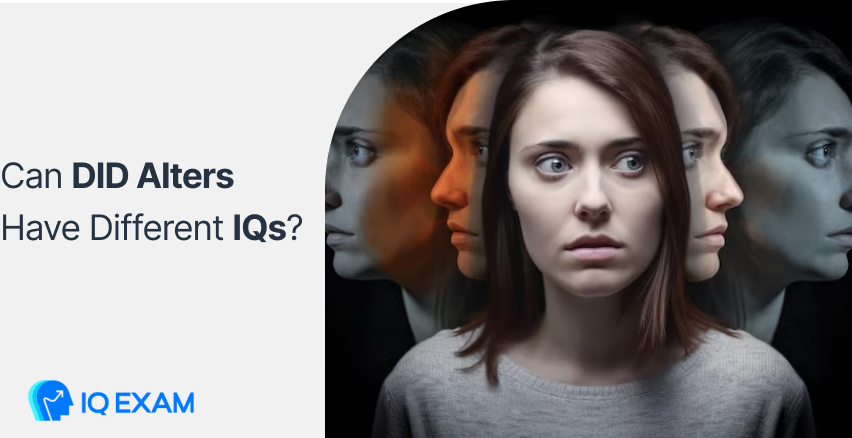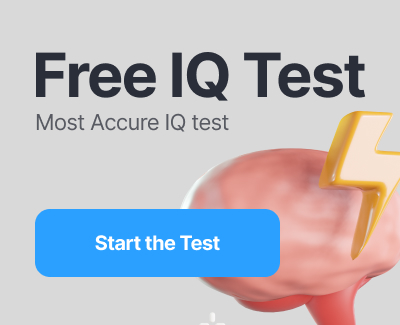
The human mind is arguably the most awe-inspiring phenomenon we’ve ever encountered. After countless years of investigation, we remain strangers to our brains. Just when we think we have unraveled all its secrets, it surprises us with new wonders.
Among the psychological conditions that challenge our understanding of the human mind, we find Dissociative Identity Disorder, also known as DID. This mental condition which is defined by the existence of numerous different identities inside a single individual, pushes the boundaries of identity and questions one’s cognitive abilities.
Therefore, a thought-provoking question that may arise is: How do we approach the measurement of IQ in dissociative Identity Disorder? This makes us think about Whether the different identities in a person’s head have different levels of intelligence.
For those curious minds, keep on reading. I promise you that by the end of this article, your perspective on DID and IQ will be changed.
What Is DID?

Dissociative Identity Disorder (DID), formerly known as Multiple Personality Disorder, is a multi-layered mental health condition that affects around 1-3% of the global population. It arises from long-lasting and extreme childhood trauma.
The trauma causes the mind to create different personalities to protect itself or even run away from the hardship. It’s basically a coping mechanism. These new personalities are called alters. They replace the traumatized child to protect them by helping them forget the trauma.
Alters might even have different ages than their actual physical age or different genders. They could have different physical abilities, allergies, diseases, sexuality, etc. It’s like sharing your body with a group of people who have their own unique personality.
Coping with DID can be very overwhelming and emotionally challenging since people with DID often experience time gaps, memory loss, and disability in remembering important personal details.
Imagine a person is driving, and their alter changes in the middle of the road. The new alter has no idea where the last alter was going. They might even not know how to drive! This is just one of the thousands of issues that alters face. Which makes managing decisions a big challenge and leads alters to feel powerless.
In What Ways Does DID Impact IQ?
In the context of DID, different alters may demonstrate variations in their cognitive abilities and IQ levels. They may also have separate educational accomplishments. There might be an alter with a Ph.D. who has a Nobel prize, while another doesn’t even know how to read and write.
Do DID Brains Look Different?

Scientific analyses have revealed that with the passage of time, those with DID develop changes in brain structures. It’s worth highlighting that research revealed a marked decrease in cortical volume particularly in the temporal lobe.
Moreover, the research identified that participants who were diagnosed with DID had a significantly smaller hippocampus compared to those without the disorder. it was detected that those who had faced more intense childhood traumas tended to have very small hippocampi.
If People With DID Could Have Different IQs Based On Which Personality They Have At The Moment, Can We Claim That Intelligence Doesn’t Characterize A Person As Much As We Once Believed?
This is a very interesting question to ask. We believe intelligence is a permanent and stable feature. However, the existence of different IQ levels for each DID alter, challenged, and questioned our beliefs.
This question draws attention to a big revelation. That a person’s intellectual abilities have the capacity to evolve depending on the state of mine. People have different talents and abilities, they can be whoever they want to be.
And this is not just about intelligence, of course, it’s about the very nature of human identity. It’s a comprehensive interaction of mental abilities, emotion management, and life events. It opens our eyes to the extensive diversity of mankind’s potential.
Identity Switching During IQ Test
Identity switch during an IQ test is quite common. Of course, the appearance of different alters can lead to changes in IQ test results and be very confusing.
Real-life Case Study That Showcases The Connection Between DID And IQ

Meet Kim Nobel, a beautiful and brave woman who inhabits a cozy South London terrace house with her 14-year-old daughter, two cute dogs, and a mind-boggling array of over 100 separate alters.
Between the ages of one and three, Kim experienced brutally damaging abuse. Which led her mind to create other personalities to protect Kim from the trauma. After going through a difficult and traumatizing childhood, she started feeling like something was wrong. She had memory loss. People called her an untruthful person when she denied her actions, But she simply didn’t remember since it wasn’t her who took those actions.
Her teachers said she had different test results each time, as if another person was taking the tests. They were surprised by Kim’s exams and were surprised to see her acting differently towards her friends every day.
Therefore her parents took her to take an IQ test and the results put everybody in shock. Her alters switch during the test. Which was quite confusing for the doctors and took them a while to diagnose her with DID.
In 2011, Kim managed to publish her book called “All of Me” which was co-authored with Jeff Hudson to share her incredible and inspiring story with the world. Encouraging the ones who were dealing with DID. To shine a light of hope into the hearts of those who are seeking an answer.
Recap
We know that DID is a mental disorder in which someone’s brain decides to create other personalities when facing trauma as a coping mechanism. The other personalities, which we call alters, tend to have different traits, genders, physical abilities, and ages. They might even speak other languages. But do they have different IQ levels as well?
When it comes to DID and the different IQ levels that each alter has, things get complicated. Current studies in neuroscience and psychology carry on illustrating the brain’s extraordinary potential for adjustment and change. The adaptability of the brain emphasizes that intelligence is not permanent and can be molded by education, environmental factors, and psychological strategies.
But still, the brain never fails to surprise us. So we keep on exploring and studying tirelessly in order to have a better understanding of our brain, making sure that we can benefit from its astonishing potential.
